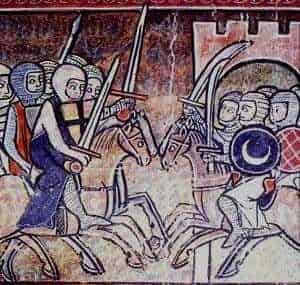"The Templar Order was not the monolithic entity which the dearth of internal documents -due to time, neglect, and the violence of its suppression- may imply. At least two extremes vied for control within the Order.
One element was heavily arabized. It preferred negotiation and, possibly, local military tactics to work within the dominant Muslim culture. Guillaume de Beaujeu, with his network of spies and his intimate knowledge of local Muslim politics and players, embodies this element perfectly. Many of the sergeants, especially the poulains (brothers of Syrian descent), and the early Templars portrayed in Usamah's anecdote also fall into this category.
The other element followed the codes and military tactics of Frankish chivalry, and opposed any compromise with the Muslims. Jacques de Molay, Gerard de Ridefort, and probably most new recruits from Europe fit into the latter category. De Ridefort, himself, had been a member of the Order for less
than five years before his election to Grand Master, although he may have spent over a decade in Palestine previous to the disaster at Hattin. He refused to adapt to local conditions of warfare--with disastrous results.
De Molay referred to this split in the Order while defending De Beaujeu's reputation against Guillaume de Nogaret's accusations of treason at the Trial. De Molay admitted that he and others had opposed De Beaujeu's cautious treaties and alliances in their youth, but insisted that De Beaujeu had been loyal to the Christian cause. Like Clement V with Boniface VIII, De Molay was forced to support his predecessor's despised policies in order to preserve the Order's reputation.
The arabist element appears to have dominated Templar policies for most of the Order's career. Although the Frankish element occasionally imposed itself from the outside (i.e., St. Bernard's patronage, Gerard de Ridefort's Mastership, and Richard l's appointees during the Third Crusade) the Order always reverted to a conciliatory policy after such martial periods. This probably derived more from the relative weakness of the Franks in Palestine than from any interreligious tolerance inherent in the Templar character. After the Order left Palestine, its general policies corresponded more to contemporary European prejudices against Muslims than before."
This blog quotes from pp 45-46 of Stiles, Paula Regina, "BETWEEN TWO FAITHS: THE ARABIZATION OF THE KNIGHTS TEMPLAR DURING THE CRUSADES" (1999). Open Access Master's Theses. Paper 1805. The illustration shows a Crusader-Muslim battle source
Support TemplarsNow™ by becoming a Patron, tipping us or buying one of our Reliable Book

No comments:
Post a Comment